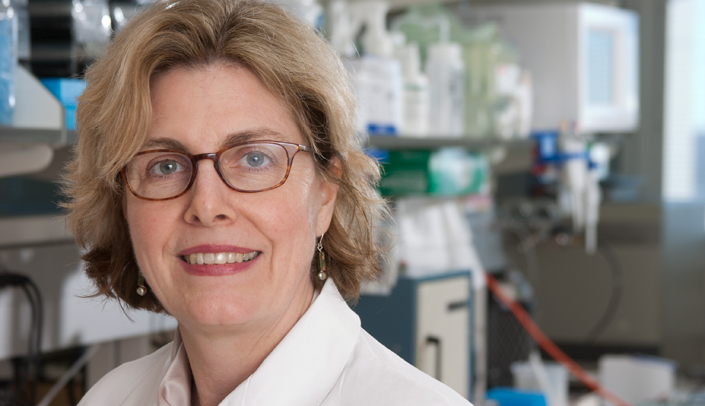The UNMC Vice Chancellor for Research Office is working to develop larger, more interdisciplinary, collaborative research interactions and teams that can answer complex research questions and lead to new grants.
Faculty members recently were surveyed to identify areas with the greatest amount of interest. Based on 266 survey responses, these areas were then grouped into 17 categories, which are likely to be the starting point for identifying the final research interest groups.
“As we launch these research interest groups, we hope to increase interactions between and across colleges, departments, and disciplines,” said Vice Chancellor for Research Jennifer Larsen, M.D. “These interactions also are meant to loop in students and other trainees and, so, will impact education at all levels, and in some cases, may even result in new models of clinical care.”
The areas identified — and the percent of faculty interested in the area — are as follows: (note: faculty were allowed to select up to three areas):
- Neuroscience and psychobehavioral (including eye disease, aging, autism, psychiatry, drugs of abuse, drug addiction and alcohol, post-traumatic stress and post-traumatic brain injury) – 31 percent
- Cardiovascular, diabetes, and obesity (including heart failure, exercise to prevent or treat, nutrition, renal and peripheral vascular, and lung disease) – 30 percent
- Cancer – 29 percent
- Child, adolescent and maternal health – 23 percent
- Immunology, autoimmunity, infectious disease – 22 percent
- Comparative effectiveness research – 17 percent
- Regenerative medicine/transplantation – 15 percent
- Drug discovery, drug delivery, nanomedicine – 14 percent
- Genetics/genomics – 13 percent
- GI/liver disease – 12 percent
- Rural and environmental health and disease – 11 percent
- Biotechnology, biomaterial and bioengineering – 8 percent
- Musculoskeletal disease – 7 percent
- Biomedical informatics – 7 percent
- Structural biology – 4 percent
- Trauma/injury prevention – 3 percent
- Educational research – 3 percent
In some areas, faculty members already have begun to meet, Dr. Larsen said. Announcements for those meetings will be made to all faculty as the program goes forward.
A new Teaching Academy is being established by Vice Chancellor for Academic Affairs Dele Davies, M.D., for faculty interested in educational research. For more information on a possible educational research interest group, please contact Howard Liu, M.D.
Listservs for the remaining groups are being established.
Faculty members interested in identifying or, in some cases, re-identifying their interest in one or more groups should contact Linda Wilkie. Other questions about the project may be submitted to Ken Bayles, Ph.D., Howard Fox, M.D., Ph.D., or Chris Kratochvil, M.D.
